In honour of the release of Trial By Fire, I wrote a post on Emily <grin>. There are a handful of spoilers for Books 1-6, so read carefully. I’ve tried to keep spoilers for Book 7 to a minimum. Comments would be more than welcome, either here or the discussion forum.
Emily is something of an unusual character for me.
In many ways, she’s probably the closest thing I have ever created to a self-insert, a character deliberately based on me. Obviously, she isn’t me (and her early life is very different), but most of her traits and issues are traits and issues that I had when I was growing up and, to some extent, overcame as I matured into adulthood. (Just how successful I have been in becoming a normal human being is, of course, debatable.) Emily, as of Book VII (Trial By Fire), is making progress on overcoming her issues, but has yet to succeed.
Emily has many good points as a character. She’s genuinely caring, she’s loyal, she’ll be ready to do almost anything to help a friend, she’s clever and she’s quite good at sticking up for others. However, she also has her bad points; she’s quite bad at noticing that other people are individuals and have problems (lack of basic empathy), she’s quite capable of slipping into her own world for days or even weeks, she doesn’t make friends easily and she’s really appallingly bad at sticking up for herself. The latter trait, in particular, has vexed some of my readers, who feel that Emily should be a great deal stronger by now. However, most of these issues come from shadows in her past that she has yet to overcome, let alone banish into the back of her mind.
My editor, reading some of the later books, accurately pegged that some of the older characters – Lady Barb, Master Gordian, Master Tor and even Master Grey – understand Emily a great deal better than she understands herself. This is something of an understandable problem. Emily would be a great deal less sympathetic as a character if she acknowledged that she was doing something wrong, or unwise, and did it anyway. I can only tell the story from Emily’s point of view and there are plenty of times where she lacks sufficient knowledge or perception to understand precisely what is going on.
Emily’s early life has been mentioned, if briefly, in the books. Her father left when she was very young and she barely remembers him. (And it’s possible she doesn’t remember him, that her memories aren’t real.) Her mother, in the process of crawling into a bottle, remarried when Emily was five; Emily’s stepfather was emotionally abusive while her mother was outright neglectful. Emily grew up having to fend for herself; she pretty much cooked for herself, picked her own clothes from second-hand shops, etc.
(On a side note, yes; this is abuse. If you think otherwise, please don’t have kids.)
This obviously had a major effect on her personality. Babies are not born naturally empathic; they generally learn those skills through interaction with their parents, siblings and eventually their fellow children. Emily simply didn’t learn these skills; her mother and stepfather ignored her when they weren’t being unpleasant, she had no real friends at school (they saw her as weird; she was too ashamed of her family to even consider bringing anyone home) and most of her time was spent reading books. She was (and is) capable of recognising abstractly that someone might have a problem, but isn’t so capable of recognising a problem before it gets rubbed in her face.
A couple of readers have compared Emily to Hermione Granger of Harry Potter. It isn’t a fair comparison. Hermione is an extrovert in many ways – she’s bossy, pushy and really didn’t lose any of her unpleasant traits even after befriending Harry and Ron – while Emily is pretty much an introvert. She and Hermione would probably not get on, if they met; she’d probably get on best with Neville.
Puberty did not improve her life. She not only had to cope with growing into young adulthood without the advice or support of her mother (who was either drunk or moaning about how horrible young men were), her stepfather actually started to take an interest in her. He never touched her, but he kept looking at her; she believed, and she might well have been right, that he would eventually force himself on her. She feared for her safety constantly; she took showers at school, wrapped herself in as many layers as possible and tried to stay away from him. It was not easy.
This tended to overshadow her relationships with her fellow teenagers. She feared ‘jerk jocks’ at a very primal level, but she also feared the ‘sticky girls’ (to borrow an expression from Sarah Hoyt); the cliques who banded together to go shopping, date the jocks and look down on everyone else. Indeed, one of Emily’s less pleasant traits is that she prefers to be in control of her friendships; her closest friends at Whitehall are people she befriended after they were largely knocked down to bedrock. She was, and still is to a very large extent, the classic outsider, the one with no hopes and dreams.
This added another wrinkle to her personality. Emily was smart enough to understand that she wasn’t likely to get anywhere in life. She could go to college/university, but all it would really get her was a mountain of debt and not much else. In a way, by the time Schooled In Magic opened, she was deep in depression and waiting to die. She believed – she genuinely believed – that there was no way out of her current state.
If you want to compare Emily to the young Edward Stalker (depicted in First To Fight) you can see they are radically different personalities. Edward Stalker, born into crushing poverty on a scale beyond Emily’s imagination, still had a thrusting drive that took him out of poverty and into the Terran Marine Corps. Emily simply lacked the self-confidence that she could better herself.
I can’t really exaggerate just how demoralising it is to feel hopeless. There’s no point in fighting if one cannot win. Emily knew she was on a sinking ship, if you don’t mind the metaphor, but she also knew the surrounding waters were full of sharks. Escape seemed impossible, so she sat down and waited to die.
And then Shadye kidnapped her.
You’ll note, at least at the start, that Emily’s instinctive response is to cling to Void. He’s pretty much the first person who actually saved her. She’s hurt when he tells her she has to go to Whitehall, even though she accepts his explanation that he’s a lousy teacher. She doesn’t start thinking about finding ways to get home, simply because she has nothing left back there. She’s already accepted her future in the Nameless World even before reaching Whitehall.
She changes, in some ways, at Whitehall because she knows life is no longer hopeless. She has magic. All of a sudden, she finds herself with a push to actually master something and succeed. She befriends Imaiqah almost at once because she needs someone to talk to and she recognises Imaiqah as being largely harmless. She starts learning to defend herself, particularly against Alassa, because she thinks she can actually win. It was a boost to her confidence to discover that most of her knowledge, her historical studies, are actually quite useful in the Nameless World.
Her slow progress to friendship with Alassa actually illuminates some of her less pleasant traits. She starts by seeing Alassa as nothing more than a bully, the stereotypical Queen Bee surrounded by a flock of admiring cronies. Even after Alassa gets badly injured by Emily, she doesn’t understand just how seriously the incident has undermined Alassa’s position. When forced to work with Alassa, Emily actually lectures her, rather than trying to be friendly. There were plenty of more mature ways to handle the situation, but Emily had yet to realise that Alassa was a person in her own right. That didn’t happen until Emily actually saw Alassa – broken and depressed – and realised that the Princess had fallen from grace. And it took being kidnapped and escaping – together – that blended the three of them (Alassa, Emily and Imaiqah) together into a long-lasting friendship.
(This is, of course, a reoccurring pattern. Emily befriends the Gorgon after the Gorgon is unjustly threatened with death, befriends Frieda after she is bullied savagely, comes to terms with Melissa after she is kicked out of her family … her relationships with people who aren’t broken down beforehand are rather more distant. She does get on with Aloha, after a rather bumpy start, but they’re not as close as she is with others. People outside her social circle tend to regard her as friendly, but reserved.)
However, it was harder for her to form meaningful relationships with older men. She did not have a bad reaction to Sergeant Harkin – because he didn’t pick on her personally – but as she slipped more into the Nameless World, she found it harder to cope with King Randor, Master Tor and – eventually – Master Grey. All three of them targeted Emily personally; King Randor clearly intended to exploit her, while Master Tor and Master Grey regarded her as a potential menace. (Master Tor, at least, had a set of valid points when he chewed her out, although she didn’t recognise it at the time; she conceded Master Grey’s points in Cockatrice.) The parts of her mentality that were shaped by her stepfather’s abuse made it hard for her to stand up to them, at least for herself. She was immobilised by her own fears.
This isn’t uncommon among bullying victims. Don’t fight back, they think, or you’ll only get hit harder.
Her relationship with Lady Barb was a little more complex. She disliked Lady Barb at first, then realised that the older woman was genuinely trying to be helpful. Over time, Emily started to think of Lady Barb as a mother, which caused problems when Emily took Lady Barb for granted (most notably in LLW.) It didn’t really help that Barb came from a very different society and tended to try to push Emily to think for herself, rather than guiding her footsteps. She knew the truth about Emily’s origins, but she didn’t really understand that Emily would react differently than someone who was a native.
Like I said, Emily is very bad at reading people. She didn’t really grasp that Jade was interested in her (at some level, she thought of Jade as a jock; a decent jock, but not someone who would be interested in her.) Nor did she recognise that Caleb or Frieda were actually interested in her – or, for that matter, that Jade and Alassa were dating.
This causes other problems, of course. Emily is not self-centred: she doesn’t believe that everything should be about her. She doesn’t begrudge Alassa and Imaiqah playing Ken even though she loathes team sports with a passion. However, it didn’t occur to her in SIS that they would want her to watch them play. Getting bored, she wanders off to do her own thing – in many ways, she was lucky the murderer chose that moment to make his appearance, as it might have caused a major rift between her and her two closest friends.
A final problem that should be borne in mind is that Emily simply was not raised within the Nameless World. (Most people expect her to be somewhat isolated, as she is generally believed to be the daughter of a powerful magician, but they think she should know more than she does.) Emily doesn’t grasp, at a very primal level, how the Nameless World actually works. There are social issues that natives take for granted that Emily doesn’t understand – in many ways, Emily isn’t too different from a condescending aid worker visiting an African village (if they bother to do that much footwork) and loudly proclaiming she knows the answers to every little problem the villagers have, even problems they don’t think are problems.
This is probably clearest in LLW. A reader noted that Emily was too politically correct in her response to the various problems she had to handle, but she couldn’t do otherwise. She might have missed the point of the parable of the prodigal son, yet she is correct (by our standards) to ask why the farm should go to the wastrel when his younger brother was the one who actually stayed home and worked the farm. (Why bother working hard when the rewards for slacking off are so much better?) However, direct line inheritance is very important in any such community and, by the pre-Emily laws, the older brother was the unquestioned heir to the land. A little later on, her revulsion at the thought of an arranged marriage with a child bride (certainly, again, by our standards) made it hard for her to consider another solution. In a sense, Emily is a reformer who doesn’t quite understand what she’s reforming.
(It touches, I feel, on the very definition of a hero. One can paint a confederate soldier, even one who owns slaves, as a good man. However, one cannot do that to a time traveller from our era, where slavery is generally accepted to be wrong. A man from 2015 who travels to 1850 and starts buying slaves to work the land is unquestionably a villain; alternatively, one who bought slaves to arm and train them to fight the slaveholders would be a hero.)
This also touches on one of my pet peeves. People have a common tendency to believe that a fantasy society must work on the same rules as our own. As a world traveller, I’ve noticed this even in our mundane world. Something that would be entirely acceptable in one country is shocking and even criminal in another. Emily is someone from a largely liberal society who has landed, without quite realising it, in a society that is actually quite stratified. (It doesn’t help that she spends most of her time in the most egalitarian place in the Nameless World.) What she considers to be harmless may not seem so harmless to the locals – or vice versa.
Even Whitehall, as Emily ruefully notes, would be shut down on Earth, with most of the teachers put into jail. There is a surprising lack of concern for health and safety, at least when it comes to learning; teenagers are armed with deadly weapons, they’re allowed to work with explosive materials, some of the spells they use can have nasty long-term effects (poor Broomstick) and discipline is harsh. To us, it sounds horrific; Mountaintop, with its Shadows, is actually worse. However, the Nameless World regards it as a necessity. Whitehall is a military academy, at base, and many students are expected – later in life – to fight against the necromancers. The magical side of the Nameless World, at least, is very aware of the growing threat.
In many ways, as Emily acknowledges, Whitehall produces more capable graduates than anything from the modern-day West. However, it is also quite bad at tending to emotional needs; indeed, anything that smacks of mental health care is taboo. (Who in their right mind would want to help the necromancers overcome their madness?) Students who have demons, like Emily, have to overcome them on their own.
However, by the time of Trial By Fire, Emily has actually made considerable progress in overcoming her demons.
Perversely, Hodge’s attempt to rape her was a blessing in disguise. Beating him convinced her, at a primal level, that she could stand up for herself. Discussing the whole matter with Lady Barb afterwards helped to organise her feelings. It strengthened her for her trials at Mountaintop and girded her against Aurelius’s manipulations. (Ironically, Nanette’s antipathy to Emily stems from her paternalistic feelings towards Aurelius; she assumed, perhaps correctly, that Emily was being groomed as her replacement.) And events at the end of Trial By Fire will only have strengthened her growth.
She has a long way to go. But she’s getting there.

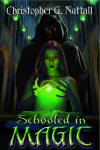
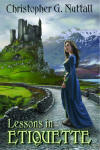
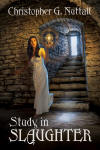


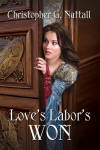
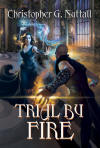
“However, it is also quite bad at tending to emotional needs…”
Let me guess Chris…you’re a Millennial, right? I ask because as a GenXer, I just automatically rolled my eyes to that one. That, and I am tired of my Millennial co-workers expecting me to ‘tend to their emotional needs’. If it were up to me, I’d fire the entire lot of them.
Chuckle Chuckle
Dennis, I think you’re over-reacting to Chris’ criticism of Whitehall.
While Chris is around 30 years old to my 61 years old, I think I saw his point.
There’s a difference IMO with a *school* being watchful of its students emotional development and a school pandering to its students “emotional needs”.
The “pandering” gives you adults in “name only” while being watchful of emotional development can result in better adults.
I’d also point out that Chris commented that Whitehall produces many more successful adults than anything in the modern West produces.
So while Chris thinks Whitehall needs some improvement in one area, he thinks that Whitehall is doing a very good job overall. [Smile]
By the way, while I don’t know your co-workers, I suspect Chris would share your opinion of them.
His adult characters never expect their co-workers to “tend to their emotional needs”. [Wink]
“While Chris is around 30 years old …”
That technically makes him a Millennial. 🙂
Btw, you might want to read this Paul to see where I am coming from with this: http://fortune.com/2015/04/22/as-a-millennial-how-do-i-understand-and-work-with-a-gen-x-er/
You might want to consider that the article writer commented that there are variations among the “older generations” and consider that Chris might have a different POV than many of the so-called “millennials”.
As I said, I’m judging Chris both by his articles and his characters.
I can’t see Chris thinking much of your co-workers.
I’m 33. MadMike said he thought I’d be older. .
More seriously, there are no shortage of idiots in every generation.
Chris
My Site: http://www.chrishanger.net/
My Blog: https://chrishanger.wordpress.com/
My Facebook Fan Page: https://www.facebook.com/ChristopherGNuttall
Whitehall is generally better at producing functional adults than schools/universities in the West these days. A lot of it comes from teaching teenagers how to learn and do things for themselves, rather than spoon-feeding them knowledge (and a “congratulations – you’ve learned not to put your hand in boiling water. Let me heal it – and don’t do it again” attitude”). That said, there’s also a very different set of home environments. Imaiqah is a merchant’s daughter, Frieda and Nanette peasants, Alassa is a princess, Jade and Caleb both came from military families, Melissa and Markus from magical families … there’s very little room for spoiling someone badly, or stupid laws that remove common sense.
Whitehall prefers the ‘hey, this is how you kick someone’s ass’ attitude to ‘the world is horrible and you need years of intensive and expensive therapy to get over it’, which is pretty much as close as it comes to dealing with emotional needs. That said, no one in their right mind would actually try to provide mental health care to a potential necromancer. (This isn’t always a good idea – Caleb’s hands come to mind.)
I’ve had quite a few bad co-workers from the same generation – and some right idiots from the earlier generation. One of them actually got us (his subordinates) into trouble because he had a particularly dunderheaded idea that led to complaints from the customers.
On the other hand, I learned very quickly that I wasn’t covered in cotton wool.
Chris
My Site: http://www.chrishanger.net/
My Blog: https://chrishanger.wordpress.com/
My Facebook Fan Page: https://www.facebook.com/ChristopherGNuttall
If it was up to me, I’d fire them too .
Though I suppose there is a certain level of cheek in asking for someone’s opinion and then complaining when you get it.
Chris
My Site: http://www.chrishanger.net/
My Blog: https://chrishanger.wordpress.com/
My Facebook Fan Page: https://www.facebook.com/ChristopherGNuttall
🙂
Speaking of millenials, look what popped up on facebook.
http://finance.yahoo.com/news/a-college-student-blows-inheritance-bert-show-205833329.html
Chris
My Site: http://www.chrishanger.net/
My Blog: https://chrishanger.wordpress.com/
My Facebook Fan Page: https://www.facebook.com/ChristopherGNuttall
Yeah, blame your parents for your mistake and “blame” them for not wanting to bail you out (even if they were able). [Frown]
It’s absurd. 90K … that would have paid for more than just my three years at university. Hell, that would have kept her going for years with a little care …
Chris
My Site: http://www.chrishanger.net/
My Blog: https://chrishanger.wordpress.com/
My Facebook Fan Page: https://www.facebook.com/ChristopherGNuttall
Thank you for the added perspective on Emily–it helps the reader understand her better. She’d still better grow up and gain power/skill fast as Whitehall can’t protect her much longer with the Grandmaster gone…
Very true.
Chris
My Site: http://www.chrishanger.net/
My Blog: https://chrishanger.wordpress.com/
My Facebook Fan Page: https://www.facebook.com/ChristopherGNuttall
Thanks for the write up. Just want to say that you’ve done a great job with Schooled In Magic in keeping the series from falling into a story about teenage romance that most YA authors seem to invariably fall into. From most of the posts on Facebook by fans, I don’t think we”re YAs . Well Done …
So much this. One of the reasons I keep coming back to this series is that the cringe worthy YA romance is absent.
To be fair, most real-life teenage romance is cringe-worthy too
Chris
My Site: http://www.chrishanger.net/
My Blog: https://chrishanger.wordpress.com/
My Facebook Fan Page: https://www.facebook.com/ChristopherGNuttall
I’ve started a bunch of YA series and by the second or third book just drop it because of the YA romance that, as you said , is cringe worthy. On that note, Chris is right.. Most of YA romance in real life is cringe worthy , which is why us old fogies don’t want to read it. We did it, why would we want to read about all the dumb stuff we did as teens?
Luckily, Chris hasn’t gone there with Emily.
In this day and age, women actually don’t need men & when YA stories fall downhill with the “women aren’t anything without a man” premise I think it turns off readers. Does me.
That’s true – all the heartbreaks of teenagers look silly when you’re twice their age. But then, there’s no perspective for them; they don’t have the life experience to understand that a single breakup is not the end of the world. They will get over it and find someone else.
I don’t think the series is going to get any more explicit – having relationships is an important part of being human, but they won’t be the focus of the series.
Chris
My Site: http://www.chrishanger.net/
My Blog: https://chrishanger.wordpress.com/
My Facebook Fan Page: https://www.facebook.com/ChristopherGNuttall
There’s a picture of Emily in a magical duel on the cover of TBF, so I don’t think this is a spoiler, but I was wondering how does Emily pushing her powers to the max affect them…do they snap back stronger, weaker…and how will the events in TBF affect how society in the nameless world treats her…are their social consequences in the magical/aristocratic society for what occurred…will King Randor change how he treats her as she shifts from a young girl he can exploit to a powerful and dangerous sorceress in her own right…
That will be covered in the next book.
Chris
My Site: http://www.chrishanger.net/
My Blog: https://chrishanger.wordpress.com/
My Facebook Fan Page: https://www.facebook.com/ChristopherGNuttall
I want to commend you on your description of Emily’s growth before and after she arrives in the Nameless World. One of the reasons I like her so much is that she is so real as a person. People who are damaged by their environment don’t just up and drop the problems and move on, it can take a lifetime to heal, and she is doing great with what she’s been handed so far. I know that in a fantasy world characters can be molded in many ways, but you have given Emily true layers of the twists and turns that emotional injuries make in understanding and healing the soul. On top of that by having her in a foreign (not alien) society, it makes the reader stop and consider what it must be like for those of us in the real world to deal with other societies.
Keep it up… this series is one of my favorites.
Thank you!
Chris
My Site: http://www.chrishanger.net/
My Blog: https://chrishanger.wordpress.com/
My Facebook Fan Page: https://www.facebook.com/ChristopherGNuttall
How many books have you planned for this series? I feel that Emily has been given many opportunites to overcome strong opponents (don’t worry, no spoilers). I would like to see a little more strength develop in her ability to stand up for herself. She has been away from home for four years now, has seen many wonders and overcome many challenges yet it still seems like the internal emotional problems she faced in book 1 are problems she faces in book 7. I look forward to seeing her deal with her inner demons and grow into a strong adult, I hope it happens soon after all she has already faced.
I’m not sure – my orginal plan was 14, but I have several ideas that may not fit into the second arc.
Chris
My Site: http://www.chrishanger.net/
My Blog: https://chrishanger.wordpress.com/
My Facebook Fan Page: https://www.facebook.com/ChristopherGNuttall
I understand that Emellys dad didnt come from the nameless world (clearly stated in book 1, thats why bloodmagic works so well on her…) BUT should kids from the nameless word not surrive puberty when they get sent into her world? (no magic to kill themselfs)
It’s a possibility.
Chris
My Site: http://www.chrishanger.net/
My Blog: https://chrishanger.wordpress.com/
My Facebook Fan Page: https://www.facebook.com/ChristopherGNuttall
just finished tbf and i wondered at the end: is Void the Grandmasters brother?
David Weber once commented that he liked to keep some information about his worlds quiet in case he had to change something. I think Chris understands this. [Smile]
That’s very true.
Chris
My Site: http://www.chrishanger.net/
My Blog: https://chrishanger.wordpress.com/
My Facebook Fan Page: https://www.facebook.com/ChristopherGNuttall
Will we ever find out more about lady barbs family? In work experience, lady barb tells Emily at the faire that if they run into her uncles, it would be best if they don’t know who she is. Do they dislike her?
Maybe. It’s something that might come into play later.
Chris
My Site: http://www.chrishanger.net/
My Blog: https://chrishanger.wordpress.com/
My Facebook Fan Page: https://www.facebook.com/ChristopherGNuttall
One thing you may wish to elaborate on in Wedding Hells is how Jade went from being uncomfortable with courting a Baroness in Work Experience to engaged to Alassa, a crown princess, in Love’s Labor’s Won–I’m not sure becoming a combat sorcerer alone and being the social equal of the minor nobility would be enough–there’s still an enormous chasm in power and social class between that and a future Queen Consort…
He’s a bit more mature, a bit more confident and Alassa is a very different person to Emily. (I should probably write their story as a novella.)
Chris
My Site: http://www.chrishanger.net/
My Blog: https://chrishanger.wordpress.com/
My Facebook Fan Page: https://www.facebook.com/ChristopherGNuttall
I really enjoy your SIM series–its one of the best fantasy series I’ve found in years…I’m curious, will Emily ever meet any women who are lone powers?? Do Lone Powers tend to live “alone” out of preference, or does a fearful society push them outside the normal power/social structures? I’m wondering because as Emily gains great power over time, will it be possible for her to live “normally” (whatever that is…) in Cockatrice…or will great power isolate her and force her outside normal society…I love the politics/sociology in the series as much as the magic…
Thank you!
There aren’t many Lone Powers – they tend to be isolated, at least from the mainstream of magical society. But yes, some of them are female.
Emily will have problems coping as she becomes more powerful too.
Chris
My Site: http://www.chrishanger.net/
My Blog: https://chrishanger.wordpress.com/
My Facebook Fan Page: https://www.facebook.com/ChristopherGNuttall
I have problems with other people constantly bailing out Emily. 😛 Or being affected by Emily’s choices. And then dying or suffering for it.
In the end I am more like Master Tor. The way I read him, is that he has nothing personal personal again her, but he is just epically stunned by the sure “stupidity” and “cluelessness” and “unwilling to grow up” that she constantly portrays (but less and less slowly now).
In my view she needs a lot more tough love to push her kicking and screaming into adulthood and maturity. And it is fun to see her rising up to new challenges. But of others to bail her out, it is both really sad, make me angry and to me somehow insults her “trying” efforts (which is good as it should make her wake up and grow faster).
But then again I am a 33 years old guy. Who has been already dragged into adulthood kicking and screaming 🙂 . Even was conscripted into the army, hating it all the way, only to (I must acknowledge) coming out a better person.
The fact that Mr Chris got me so invested into this world is a testament to his writing of characters and world builds.
There’s a lot of truth in that
Chris
My Site: http://www.chrishanger.net/
My Blog: https://chrishanger.wordpress.com/
My Facebook Fan Page: https://www.facebook.com/ChristopherGNuttall
Will Emily ever have the time to take possession or read all the books aurelious left her??
Probably.
Chris
My Site: http://www.chrishanger.net/
My Blog: https://chrishanger.wordpress.com/
My Facebook Fan Page: https://www.facebook.com/ChristopherGNuttall